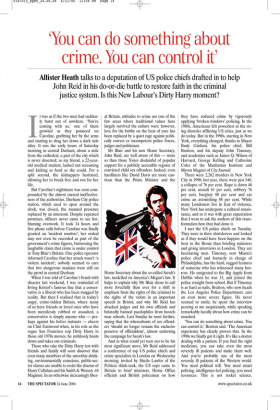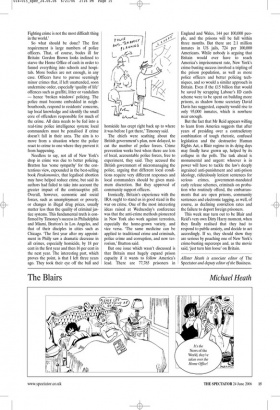‘You can do something about crime. You can control it’
Allister Heath talks to a deputation of US police chiefs drafted in to help John Reid in his do-or-die battle to restore faith in the criminal justice system. Is this New Labour’s Dirty Harry moment?
It was as if the two men had suddenly burst out of nowhere. ‘You’re coming with us,’ one of them growled as they pounced on Caroline, grabbing her by the arms and starting to drag her down a dark side alley. It was the early hours of Saturday morning in central Durham, about a mile from the cathedral, a part of the city which is never deserted; so my friend, a 22-yearold medical student, lashed out screaming and kicking as hard as she could. For a split second, the kidnappers hesitated, allowing her to break free and run for her life.
But Caroline’s nightmare was soon compounded by the almost surreal ineffectiveness of the authorities. Durham City police station, which used to open around the clock, was closed, the manned presence replaced by an intercom. Despite repeated promises, officers never came to see her, blaming overwork. It took 14 hours and five phone calls before Caroline was finally granted an ‘incident number’; her ordeal may not even be recorded as part of the government’s crime figures, buttressing the laughable claim that crime is under control in Tony Blair’s Britain. One police operator informed Caroline that her attack wasn’t ‘a violent incident’; nobody seemed to care that two dangerous maniacs were still on the prowl in central Durham.
When I was told of Caroline’s brush with disaster last weekend, I was reminded of Irving Kristol’s famous line that a conservative is a liberal who has been mugged by reality. But then I realised that in today’s angry, crime-ridden Britain, where many of us have friends or loved ones who have been mercilessly robbed or assaulted, a conservative is simply anyone who — perhaps against his better instincts — cheers on Clint Eastwood when, in his role as the rogue San Francisco cop Dirty Harry in those old 1970s movies, he ruthlessly hunts down and takes out criminals.
Those who take the Dirty Harry test with friends and family will soon discover that even many members of the smoothie-drinking, environmentally conscious, public-sector classes are unable to resist the charms of Harry Callahan and his Smith & Wesson .44 Magnum. In an otherwise increasingly liber al Britain, attitudes to crime are one of the few areas where traditional values have largely survived the culture wars; however, love for the bobby on the beat of yore has been replaced by a quiet rage against politically correct or incompetent police forces, judges and politicians.
Mr Blair and his new Home Secretary, John Reid, are well aware of this — more so than those Tories disdainful of popular support for a publicly accessible register of convicted child sex offenders. Indeed, even hardliners like David Davis are more cautious than the Prime Minister and the Home Secretary about the so-called Sarah’s law, modelled on America’s Megan’s law. It helps to explain why Mr Blair chose to call more forcefully than ever for a shift in emphasis from the rights of the criminal to the rights of the victim in an important speech in Bristol, and why Mr Reid has attacked judges and his own officials and belatedly banned paedophiles from hostels near schools. Last Sunday he went further, saying that the whereabouts of sex offenders ‘should no longer remain the exclusive preserve of officialdom’, almost endorsing the campaign for Sarah’s law.
And in what could yet turn out to be his most significant move, Mr Reid addressed a conference of top US police chiefs and crime specialists in London on Wednesday morning; invited by Sheila Lawlor of the Politeia think-tank, the US cops came to Britain to brief ministers, Home Office officials and British policemen on how they have reduced crime by vigorously applying ‘broken windows’ policing. In the 1980s, Americans felt powerless at the rising disorder afflicting US cities, just as we do today. But in the 1990s, starting in New York, everything changed, thanks to Mayor Rudy Giuliani, his police chief, Bill Bratton, and his deputy John Timoney, and academics such as James Q. Wilson of Harvard, George Kelling and Catherine Coles of the Manhattan Institute and Myron Magnet of City Journal.
There were 2,262 murders in New York City in 1990; last year, there were just 540, a collapse of 76 per cent. Rape is down 48 per cent, assault 61 per cent, robbery 76 per cent, burglary 80 per cent and car crime an astonishing 88 per cent. While many Londoners live in fear of violence, New York has undergone a cultural renaissance, and so it was with great expectation that I went to ask the authors of this transformation how they had done it.
I met the US police chiefs on Tuesday. They were in their shirtsleeves and looked as if they would have been happier on the beat in the Bronx than briefing ministers and giving interviews in London. They are fascinating men. Timoney, now Miami’s police chief and formerly in charge of Philadelphia, has the hard, rugged features of someone who has witnessed many horrors. He emigrated to the Big Apple from Dublin when he was 13, and joined the police straight from school. But if Timoney is as hard as nails, Bratton, who now heads the Los Angeles Police Department, cuts an even more severe figure. He never seemed to smile; he spent the interview peering at me suspiciously, while speaking remarkably lucidly about how crime can be smashed.
‘You can do something about crime. You can control it,’ Bratton said. ‘The American experience has clearly proven that. In the 1990s we finally got it right. It’s like a doctor dealing with a patient. If you find the right medicines, you can take even the most severely ill patients and make them well. And you’re probably one of the most severely ill patients of the Western world. You need political will. You need smart policing, intelligence-led policing, you need resources. This is not rocket science. Fighting crime is not the most difficult thing in the world.’ So what should be done? The first requirement is large numbers of police officers. That, of course, bodes ill for Britain: Gordon Brown looks inclined to starve the Home Office of cash in order to funnel everything into schools and hospitals. More bodies are not enough, in any case. Officers have to pursue seemingly minor crimes that, if left unattended, soon undermine order, especially ‘quality of life’ offences such as graffiti, litter or vandalism — hence ‘broken windows’ policing. The police must become embedded in neighbourhoods, respond to residents’ concerns, tap local knowledge and identify the small core of offenders responsible for much of the crime. All data needs to be fed into a real-time police intelligence system; local commanders must be penalised if crime doesn’t fall in their area. The aim is to move from a situation where the police react to crime to one where they prevent it from happening.
Needless to say, not all of New York’s drop in crime was due to better policing. Bratton has ‘some sympathy’ for the contentious view, expounded in the best-selling book Freakonomics, that legalised abortion may have helped reduce crime, but said its authors had failed to take into account the greater impact of the contraceptive pill. Overall, however, economic and social forces, such as unemployment or poverty, or changes in illegal drug prices, usually matter less than the quality of criminal justice systems. This fundamental truth is confirmed by Timoney’s success in Philadelphia and Miami, Bratton’s in Los Angeles, and that of their disciples in cities such as Chicago. ‘The first year after my appointment in Philly saw a dramatic decrease in all crimes, especially homicide, by 18 per cent in the first year and then 16 per cent in the next year. The interesting part, which proves the point, is that I left three years ago. They took their eye off the ball and homicide has crept right back up to where it was before I got there,’ Timoney said.
The chiefs were scathing about the British government’s plan, now delayed, to cut the number of police forces. Crime prevention works best when there are lots of local, accountable police forces, free to experiment, they said. They accused the British government of micromanaging the police, arguing that different local conditions require very different responses and local commanders should be given maximum discretion. But they approved of community support officers.
Ironically, Britain’s experience with the IRA ought to stand us in good stead in the war on crime. One of the most interesting ideas raised at Wednesday’s conference was that the anti-crime methods pioneered in New York also work against terrorists, especially the home-grown variety, and vice versa. ‘The same medicine can be applied to traditional crime and criminals, police crime and corruption, and now terrorism,’ Bratton said.
But one issue which wasn’t discussed is that Britain must hugely expand prison capacity if it wants to follow America’s lead. There are 77,785 prisoners in England and Wales, 144 per 100,000 people, and the prisons will be full within three months. But there are 2.1 million inmates in US jails, 724 per 100,000 Americans. While nobody is arguing that Britain would ever have to reach America’s imprisonment rate, New York’s crime-busting success involved a tripling of the prison population, as well as more police officers and better policing techniques, and so would a similar approach in Britain. Even if the £15 billion that would be saved by scrapping Labour’s ID cards scheme were to be spent on building more prisons, as shadow home secretary David Davis has suggested, capacity would rise to only 95,000 inmates, which is nowhere near enough.
But the fact that Mr Reid appears willing to learn from America suggests that after years of presiding over a contradictory combination of tough rhetoric, confused legislation and the destructive Human Rights Act, a Blair regime in its dying days may finally have grown up, helped by its collapse in the polls. The task ahead is monumental and urgent: whoever is in power will have to tackle the law’s deeply ingrained anti-punishment and anti-prison ideology, ridiculously lenient sentences for serious crimes, government-mandated early release schemes, criminals on probation who routinely offend, the embarrassments that are open prisons, community sentences and electronic tagging, as well, of course, as declining conviction rates and the failure to deport foreign prisoners.
This week may turn out to be Blair and Reid’s very own Dirty Harry moment, when they finally realised that they had to respond to public anxiety, and decide to act accordingly. If so, they should show they are serious by poaching one of New York’s crime-busting supercops and, as the movie said, ‘just turn him loose’ on Britain.




















































 Previous page
Previous page